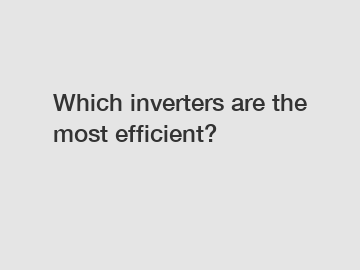Which inverters are the most efficient?
When it comes to choosing an inverter, efficiency is key. Inverters are an essential component of any solar power system, converting the direct current (DC) electricity generated by solar panels into alternating current (AC) electricity that can be used to power homes and businesses. Fortunately, there are many efficient inverters on the market today that can help maximize the performance of your solar power system. In this article, we will discuss which inverters are the most efficient and how you can choose the right one for your needs.
### String Inverters.
String inverters are the most commonly used type of inverter in solar power systems. They are typically installed in a central location and are connected to multiple solar panels in a series, or "string." String inverters are known for their reliability and cost-effectiveness. However, they are not always the most efficient option, especially when some panels in the string are shaded or not performing optimally.

### Microinverters.
Microinverters are another popular option for solar power systems. Unlike string inverters, microinverters are installed on individual solar panels, allowing each panel to operate independently. This can significantly increase the overall efficiency of the system, especially in situations where panels are partially shaded or facing different directions. Microinverters are also known for their reliability and offer more flexibility in system design.
### Power Optimizers.
Power optimizers are a compromise between string inverters and microinverters. They are installed at the individual panel level, like microinverters, but they still use a central string inverter to convert the electricity from DC to AC. Power optimizers can help increase the efficiency of a solar power system by mitigating the impact of shading or panel mismatch. They can also provide additional monitoring and control capabilities.
### Hybrid Inverters.
Hybrid inverters are designed to work with both solar panels and energy storage systems, such as batteries. They can prioritize the use of solar energy or stored energy depending on the time of day or the electricity rates. Hybrid inverters are becoming increasingly popular as more homeowners and businesses look to maximize their energy independence and self-consumption. While hybrid inverters may not always be the most efficient option for solar power systems, they offer significant benefits in terms of flexibility and resilience.
### Choosing the Most Efficient Inverter.
When choosing an inverter for your solar power system, it is essential to consider your specific needs and constraints. Factors such as the size of your system, the orientation of your panels, and the presence of shading will all influence the efficiency of different inverter options. Consulting with a solar energy professional can help you evaluate your options and make an informed decision.
In conclusion, there are many efficient inverters available on the market today, each with its own strengths and weaknesses. String inverters are reliable and cost-effective but may not be the most efficient option for all situations. Microinverters offer increased efficiency and flexibility but come at a higher cost. Power optimizers and hybrid inverters provide alternative solutions that can help maximize the performance of your solar power system. By carefully evaluating your needs and working with a solar energy professional, you can choose the most efficient inverter for your specific situation.
If you have any questions about choosing the most efficient inverter for your solar power system, please feel free to contact us.
If you want to learn more, please visit our website commercial inverters, china solar inverter suppliers, 3 phase micro inverter.

Comments
0